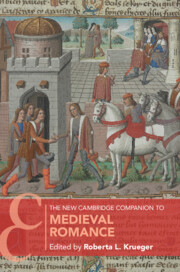Book contents
- The New Cambridge Companion to Medieval Romance
- The New Cambridge Companion to Medieval Romance
- Copyright page
- Contents
- Figures
- Contributors
- Acknowledgments
- Chronology
- Introduction
- 1 “For Love and For Lovers”
- 2 The Manuscript Contexts of Medieval Romance
- 3 Matters of Form
- 4 Authors, Narrators, and Their Stories in Old French Romance
- 5 Arthurian Transformations
- 6 Romance and the Medieval Mediterranean
- 7 The Crusading Romance in Britain
- 8 “Making Race” in Medieval Romance
- 9 The Construction and Interrogation of Gender in Old French Romance
- 10 Emotions as the Language of Romance
- 11 Medieval Iberian Romance
- 12 Medieval and Early Modern Italian Romance
- 13 German Medieval Romance
- 14 The Ends of Romance in Chaucer and Malory
- 15 French Romance in the Late Middle Ages and the Renaissance
- 16 Romance in Historical Context
- 17 Romance in Twentieth- and Twenty-First-Century Popular Culture
- Bibliography of Editions and Translations
- Index
- Cambridge Companions To …
- References
11 - Medieval Iberian Romance
Published online by Cambridge University Press: 11 May 2023
- The New Cambridge Companion to Medieval Romance
- The New Cambridge Companion to Medieval Romance
- Copyright page
- Contents
- Figures
- Contributors
- Acknowledgments
- Chronology
- Introduction
- 1 “For Love and For Lovers”
- 2 The Manuscript Contexts of Medieval Romance
- 3 Matters of Form
- 4 Authors, Narrators, and Their Stories in Old French Romance
- 5 Arthurian Transformations
- 6 Romance and the Medieval Mediterranean
- 7 The Crusading Romance in Britain
- 8 “Making Race” in Medieval Romance
- 9 The Construction and Interrogation of Gender in Old French Romance
- 10 Emotions as the Language of Romance
- 11 Medieval Iberian Romance
- 12 Medieval and Early Modern Italian Romance
- 13 German Medieval Romance
- 14 The Ends of Romance in Chaucer and Malory
- 15 French Romance in the Late Middle Ages and the Renaissance
- 16 Romance in Historical Context
- 17 Romance in Twentieth- and Twenty-First-Century Popular Culture
- Bibliography of Editions and Translations
- Index
- Cambridge Companions To …
- References
Summary
The story of the medieval Romance on the Iberian Peninsula is a bit more complicated than that we read in traditional histories of Spanish or Catalan literature. Hebrew and Arabic authors also wrote texts that could be classified as romances some years before the Castilian Grail and Amadís. These authors adapted the motifs of Arthurian or chivalric romance, combining them with the literary tropes and conventions familiar to them from Hebrew and Arabic traditions. Others, such as the anonymous author of Cavallero Zifar (Castilian, anonymous, ca. 1300) and Ramon Llull in his ecclesisastical Romance, Blaquerna (Catalan), transform the conventions of romance to suit their own ecclesiastical and spiritual purposes. In this way, if we imagine romance in Iberia less as a stable genre with a canon and more as a set of conventions and tropes that authors recombined in novel ways, we see it as a literary practice that crosses languages and religious groups, but that in some ways shares chivalric and literary values across these differences.
Keywords
- Type
- Chapter
- Information
- The New Cambridge Companion to Medieval Romance , pp. 167 - 179Publisher: Cambridge University PressPrint publication year: 2023



